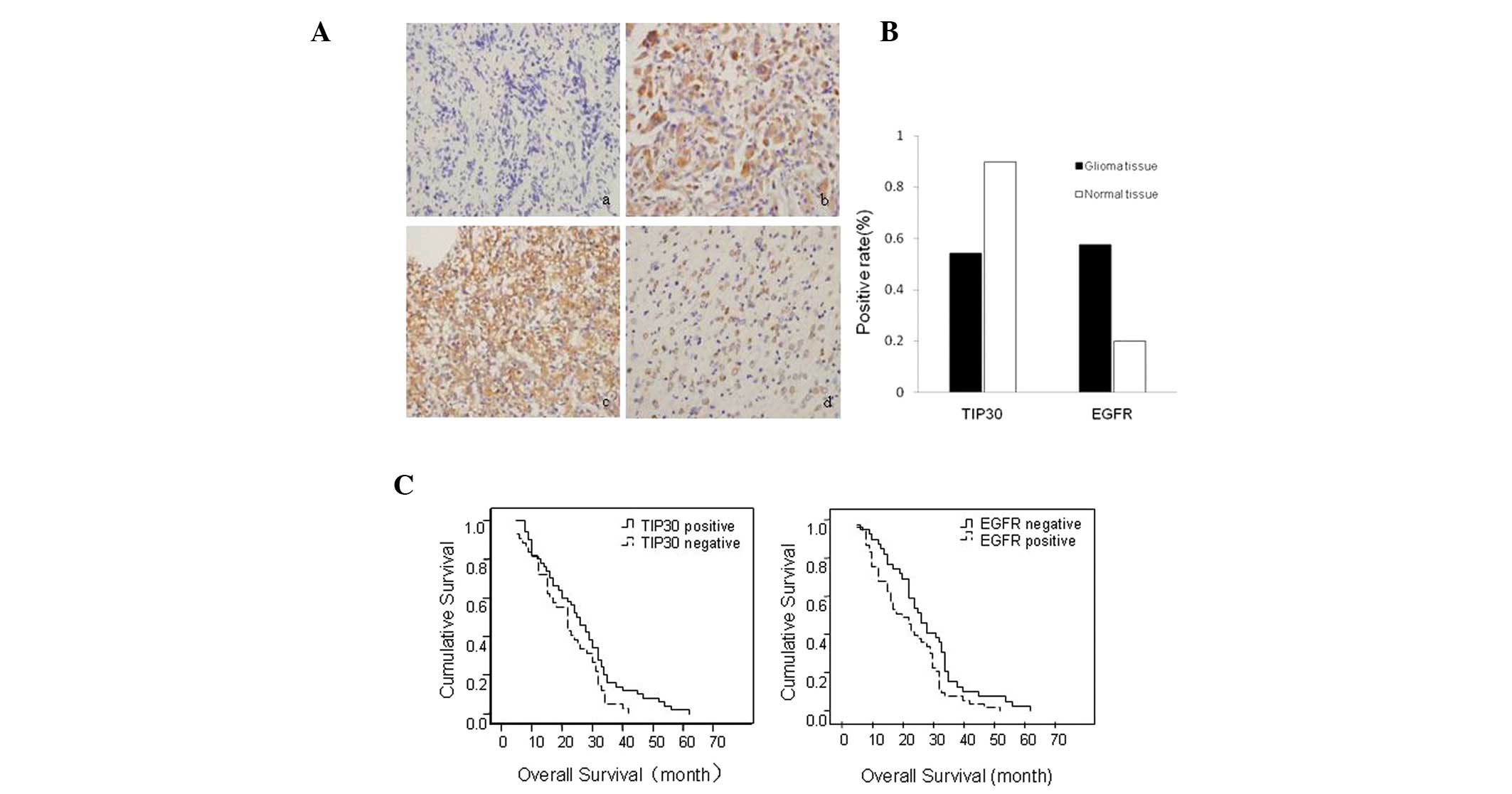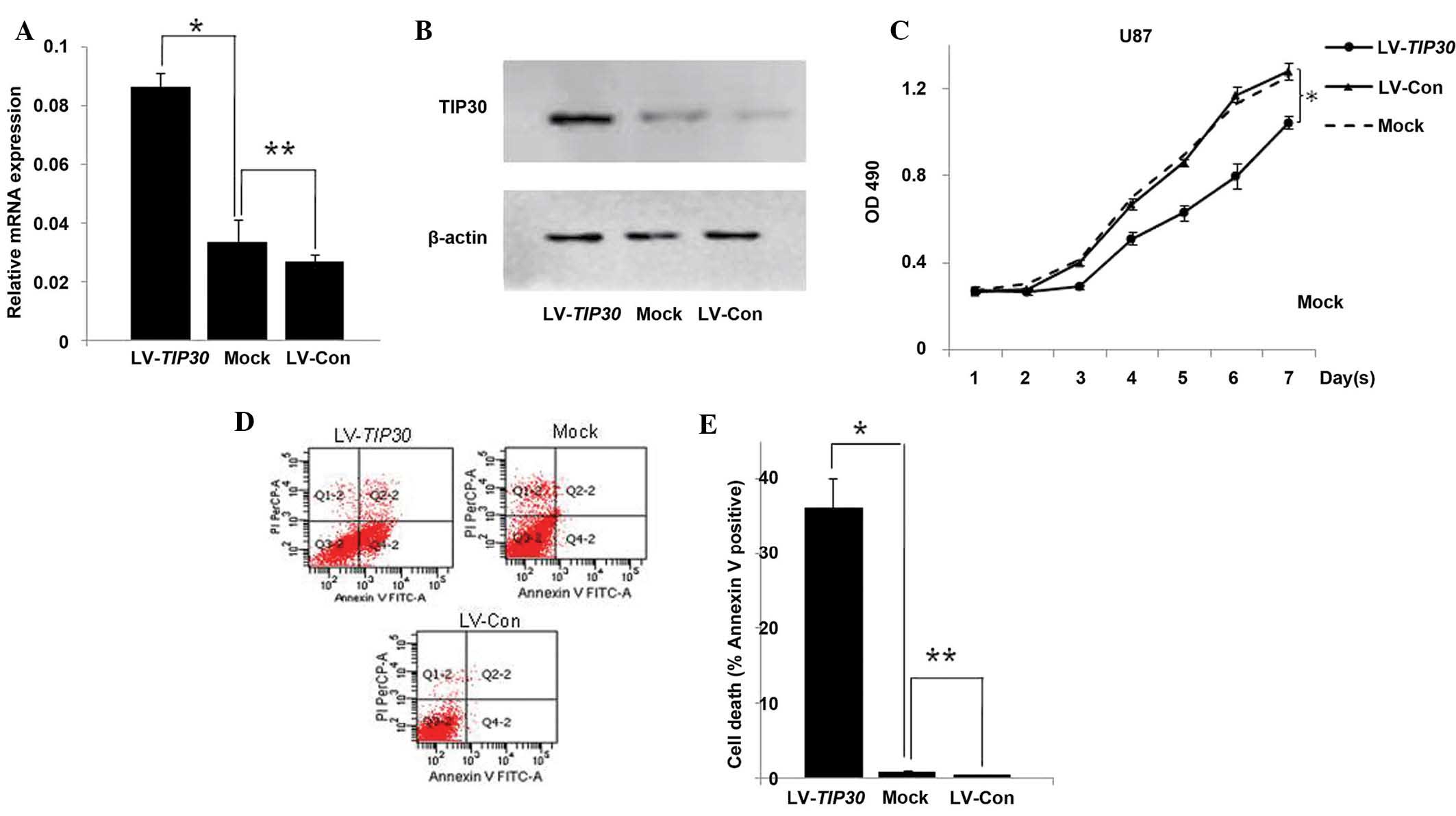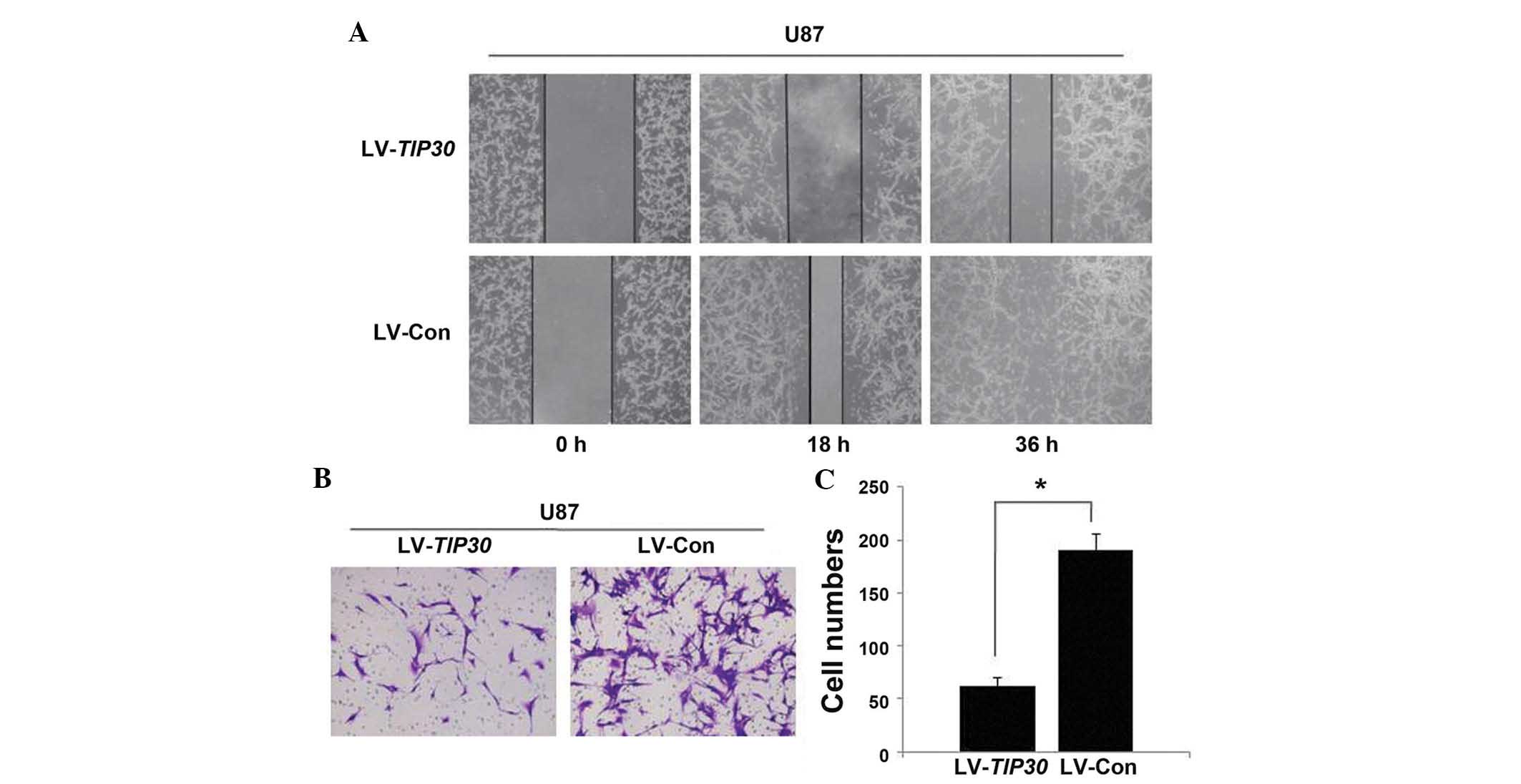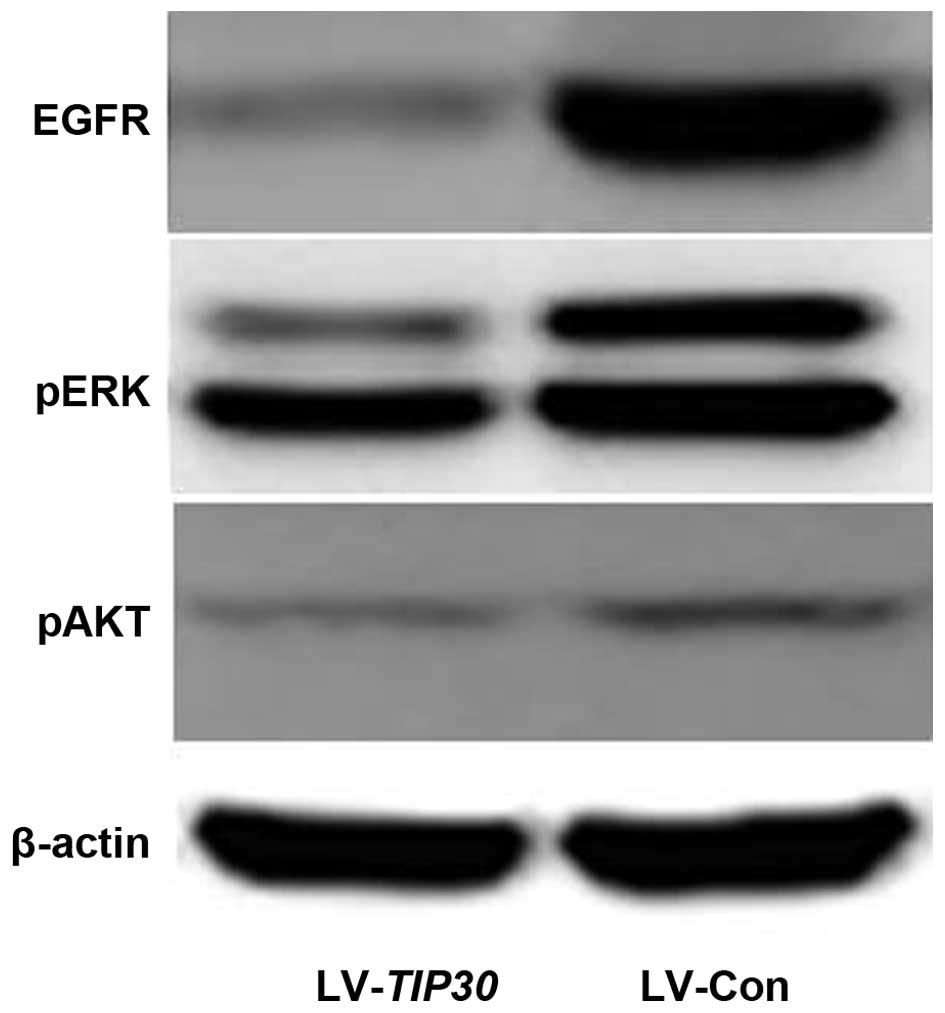|
1
|
Nygaard SJ, Haugland HK, Laerum OD,
Lund-Johansen M, Bjerkvig R and Tysnes OB: Dynamic determination of
human glioma invasion in vitro. J Neurosurg. 89:441–447. 1998.
View Article : Google Scholar : PubMed/NCBI
|
|
2
|
Wen PY and Kesari S: Malignant gliomas in
adults. N Engl J Med. 395:492–507. 2008. View Article : Google Scholar
|
|
3
|
Stupp R, Hegi ME, van den Bent MJ, Mason
WP, Weller M, Mirimanoff RO and Cairncross JG; European
Organisation for Research and Treatment of Cancer Brain Tumor and
Radiotherapy Groups and National Cancer Institute of Canada
Clinical Trials Group: Changing paradigms - an update on the
multidisciplinary management of malignant glioma. Oncologist.
11:165–180. 2006. View Article : Google Scholar : PubMed/NCBI
|
|
4
|
Shtivelman E: A link between metastasis
and resistance to apoptosis of variant small cell lung carcinoma.
Oncogene. 14:2167–2173. 1997. View Article : Google Scholar : PubMed/NCBI
|
|
5
|
Xiao H, Palhan V, Yang Y and Roeder RG:
TIP30 has an intrinsic kinase activity required for up-regulation
of a subset of apoptotic genes. EMBO J. 19:956–963. 2000.
View Article : Google Scholar : PubMed/NCBI
|
|
6
|
Xiao H, Tao Y, Greenblatt J and Roeder RG:
A cofactor, TIP30, specifically enhances HIV-1 Tat-activated
transcription. Proc Natl Acad Sci USA. 95:2146–2151. 1998.
View Article : Google Scholar : PubMed/NCBI
|
|
7
|
Huang QD, Hu XQ, Wan L, Gao GH, Zheng SR,
You J and Guo GL: Clinical significance of CC3/TIP30 expression in
breast carcinoma and its correlation with HER-2/neu. Zhonghua Wai
Ke Za Zhi. 50:57–61. 2012.In Chinese. PubMed/NCBI
|
|
8
|
Tong X, Li K, Luo Z, Lu B, Liu X, Wang T,
Pang M, Liang B, Tan M, Wu M, et al: Decreased TIP30 expression
promotes tumor metastasis in lung cancer. Am J Pathol.
174:1931–1939. 2009. View Article : Google Scholar : PubMed/NCBI
|
|
9
|
Lu B, Ma Y, Wu G, Tong X, Guo H, Liang A,
Cong W, Liu C, Wang H, Wu M, et al: Methylation of Tip30 promoter
is associated with poor prognosis in human hepatocellular
carcinoma. Clin Cancer Res. 14:7405–7412. 2008. View Article : Google Scholar : PubMed/NCBI
|
|
10
|
Li X, Zhang Y, Cao S, Chen X, Lu Y, Jin H,
Sun S, Chen B, Liu J, Ding J, et al: Reduction of TIP30 correlates
with poor prognosis of gastric cancer patients and its restoration
drastically inhibits tumor growth and metastasis. Int J Cancer.
124:713–721. 2009. View Article : Google Scholar
|
|
11
|
Chen X, Cao X, Dong W, Luo S, Suo Z and
Jin Y: Expression of TIP30 tumor suppressor gene is down-regulated
in human colorectal carcinoma. Dig Dis Sci. 55:2219–2226. 2010.
View Article : Google Scholar
|
|
12
|
Shi M, Zhang X, Wang P, Zhang HW, Zhang BH
and Wu MC: TIP30 regulates apoptosis-related genes in its apoptotic
signal transduction pathway. World J Gastroenterol. 11:221–227.
2005. View Article : Google Scholar : PubMed/NCBI
|
|
13
|
NicAmhlaoibh R and Shtivelman E:
Metastasis suppressor CC3 inhibits angiogenic properties of tumor
cells in vitro. Oncogene. 20:270–275. 2001. View Article : Google Scholar : PubMed/NCBI
|
|
14
|
Fong S, King F and Shtivelman E: CC3/TIP30
affects DNA damage repair. BMC Cell Biol. 11:232010. View Article : Google Scholar : PubMed/NCBI
|
|
15
|
Sonveaux P: Loss of CC3/TIP30 allows tumor
cells to cope with low glucose. Cell Cycle. 10:3762011. View Article : Google Scholar : PubMed/NCBI
|
|
16
|
Nakahara J, Kanekura K, Nawa M, Aiso S and
Suzuki N: Abnormal expression of TIP30 and arrested
nucleocytoplasmic transport within oligodendrocyte precursor cells
in multiple sclerosis. J Clin Invest. 119:169–181. 2009.
|
|
17
|
Herbst RS and Shin DM: Monoclonal
antibodies to target epidermal growth factor receptor-positive
tumors: A new paradigm for cancer therapy. Cancer. 94:1593–1611.
2002. View Article : Google Scholar : PubMed/NCBI
|
|
18
|
Humphrey PA, Wong AJ, Vogelstein B,
Friedman HS, Werner MH, Bigner DD and Bigner SH: Amplification and
expression of the epidermal growth factor receptor gene in human
glioma xenografts. Cancer Res. 48:2231–2238. 1988.PubMed/NCBI
|
|
19
|
Zhang C, Li A, Zhang X and Xiao H: A novel
TIP30 protein complex regulates EGF receptor signaling and
endocytic degradation. J Biol Chem. 286:9373–9381. 2011. View Article : Google Scholar : PubMed/NCBI
|
|
20
|
Louis DN, Ohgaki H, Wiestler OD, Cavenee
WK, Burger PC, Jouvet A, Scheithauer BW and Kleihues P: The 2007
WHO classification of tumours of the central nervous system. Acta
Neuropathol. 114:97–109. 2007. View Article : Google Scholar : PubMed/NCBI
|
|
21
|
Shi M, Yan SG, Xie ST and Wang HN:
Tip30-induced apoptosis requires translocation of Bax and involves
mitochondrial release of cytochrome c and Smac/DIABLO in
hepatocellular carcinoma cells. Biochim Biophys Acta. 1783:263–274.
2008. View Article : Google Scholar
|
|
22
|
Zhao J, Lu B, Xu H, Tong X, Wu G, Zhang X,
Liang A, Cong W, Dai J, Wang H, et al: Thirty-kilodalton
Tat-interacting protein suppresses tumor metastasis by inhibition
of osteopontin transcription in human hepatocellular carcinoma.
Hepatology. 48:265–275. 2008. View Article : Google Scholar : PubMed/NCBI
|
|
23
|
Jiang C, Pecha J, Hoshino I, Ankrapp D and
Xiao H: TIP30 mutant derived from hepatocellular carcinoma
specimens promotes growth of HepG2 cells through up-regulation of
N-cadherin. Cancer Res. 67:3574–3582. 2007. View Article : Google Scholar : PubMed/NCBI
|
|
24
|
Halatsch ME, Schmidt U, Behnke-Mursch J,
Unterberg A and Wirtz CR: Epidermal growth factor receptor
inhibition for the treatment of glioblastoma multiforme and other
malignant brain tumours. Cancer Treat Rev. 32:74–89. 2006.
View Article : Google Scholar : PubMed/NCBI
|
|
25
|
Zhang C, Mori M, Gao S, Li A, Hoshino I,
Aupperlee MD, Haslam SZ and Xiao H: Tip30 deletion in MMTV-Neu mice
leads to enhanced EGFR signaling and development of estrogen
receptor-positive and progesterone receptor-negative mammary
tumors. Cancer Res. 70:10224–10233. 2010. View Article : Google Scholar : PubMed/NCBI
|
|
26
|
Zhang C, Li A, Gao S, Zhang X and Xiao H:
The TIP30 protein complex, arachidonic acid and coenzyme A are
required for vesicle membrane fusion. PLoS One. 6:e212332011.
View Article : Google Scholar : PubMed/NCBI
|


















